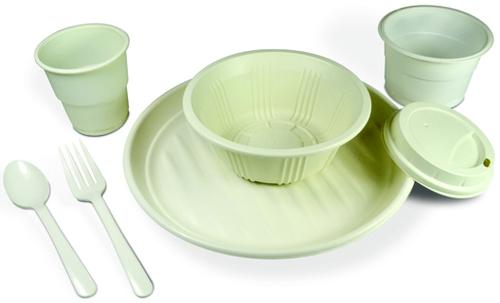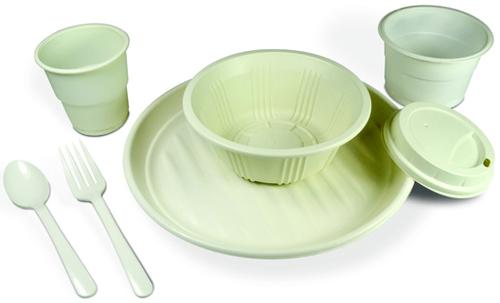March 23, 2012

Although bioplastics are still a very small part of the plastic waste stream, some manufacturers are talking to recyclers about developing recycling processes for their products. NatureWorks, for example, is working with the Association of Post-Consumer Plastic Recyclers to help develop mechanical and chemical recycling processes for its Ingeo materials, as well as end-markets for the recycled plastic, Steve Davies, global director of marketing and public affairs, told us.
Non-recycled petroleum-based plastics are a big problem in landfills. If left untreated, they don't biodegrade for a long time. And if not recycled or converted to fuel or electricity, the energy they contain is wasted. Estimates of how much plastic goes into landfills vary depending on who's measuring, but according to the EPA, only 12 percent of US plastics got recycled in 2010.

Bioplastics end-of-life solutions are composting or recycling, depending on whether it's single-use or durable. "Composting plastic turns it back into the CO2 and water it started as, which closes the cradle-to-cradle loop but doesn't give an opportunity for re-use," said Davies. "This makes sense in compostable food packaging and food serviceware. Since no one sorts the food waste from the plastic waste for recycling, it all goes to the landfill anyway, where compostable materials can biodegrade. Many food serviceware plastic makers now have a compostable version."
Durable bioplastics aren't compostable, and are harder to recycle than single-use bioplastics, Kent Furst, industry analyst for the Freedonia Group, said in an interview. "First, they are often made durable by adding reinforcing agents and fillers, and these can interfere with the recycling process. Second, sometimes the bioplastic is made durable by being blended with conventional plastics, and it becomes difficult to separate the materials for recycling."
Actually, most higher-performance engineering plastics are tough to recycle, bio-based or not, because of the potential for contamination, which can drastically reduce the recycled resin's desirable properties. "So special handling, such as for scrap, is required for high-performance plastics if they are to be recycled into a material that has properties similar to the original," said Furst. "These guidelines for special handling and processing must be made available to recyclers. Some durable bioplastic vendors are addressing these problems by providing the relevant information to their processor customers."
About the Author(s)
You May Also Like



